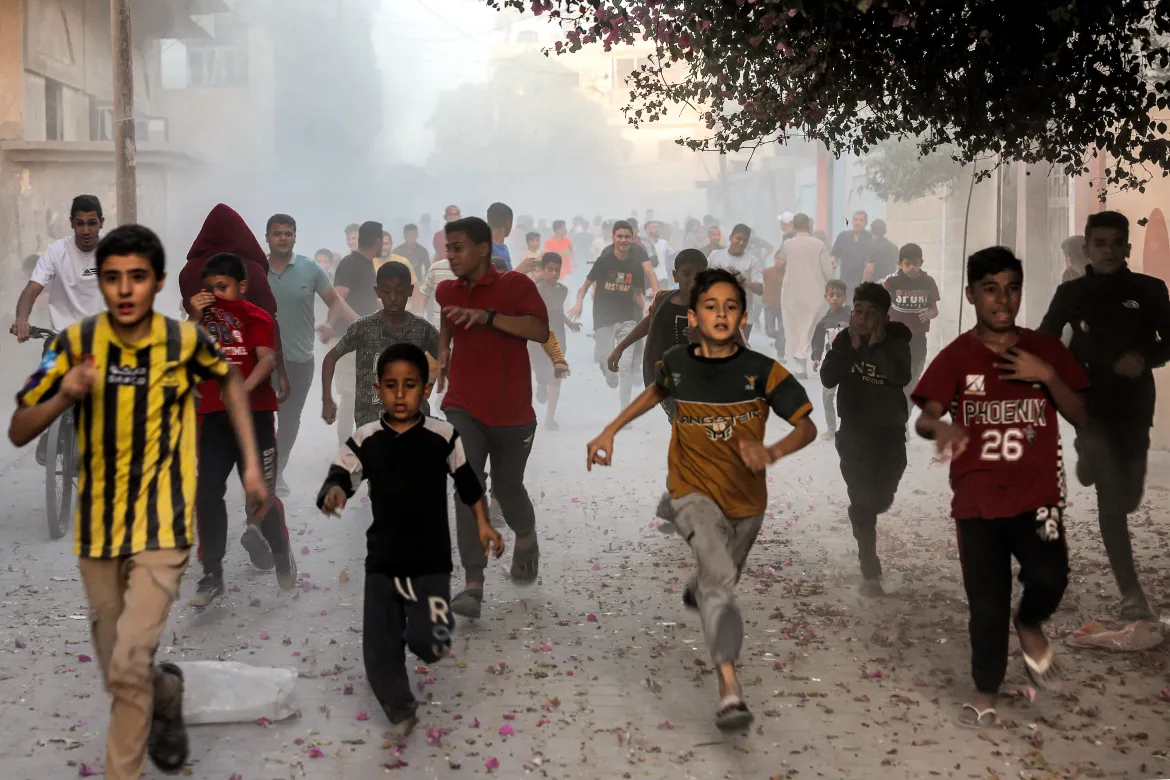As the world watches the genocide in Gaza
Thousands of people have died and thousands more have been injured since Hamas launched an unprecedented surprise attack on Israel on Oct. 7. Israel retaliated with a bombing campaign and a total siege of the neighbouring Gaza Strip. In Israel, at least 1,400 people are said to have been killed and 6,900 others injured since […]

FILE PHOTO: Palestinian children run as they flee from an Israeli bombardment in Rafah. Rafah, Gaza Photo: Mohammed Abed/AFP/Getty Images
Thousands of people have died and thousands more have been injured since Hamas launched an unprecedented surprise attack on Israel on Oct. 7. Israel retaliated with a bombing campaign and a total siege of the neighbouring Gaza Strip. In Israel, at least 1,400 people are said to have been killed and 6,900 others injured since Oct. 7
More than 11,100 Palestinians have been killed in Gaza, the city raised down by the Israeli military, and innocent children have been killed, with the whole city living in fear with no social amenities. The attacks by both Hamas and the Israeli military have put a harsh spotlight on the region’s ongoing conflict, prompting protests around the world.
The attack on Israel by Hamas and the current siege on Gaza, the humanitarian crisis that has followed and the death of thousands of innocent people, including women and children, cannot be justified under any guise. Whatever Israel may be trying to achieve in Gaza, the aftermath will be deeper hate, greater violence and a further deferment of the much-needed peace in the region.
Contrary to what some Nigerians believe, the crisis in the Middle East is not about Christianity and Islam. In fact, it is one of the most complicated land disputes in history, which the world powers have failed abysmally to resolve because of apparent insincerity of purpose. The question of Palestine is fundamentally about justice and tolerance. The Palestinians are being denied basic humanity, thus the reason the crisis persists and it is not likely to be resolved by the force of arms.
- Climate change: Yobe to plant 40m trees in 5 years
- Why govt alone can’t develop any nation— Lagos dep gov
Indeed, the main challenge in the Israeli-Palestinian crisis that has over the years led to a cycle of revenge killings, including the latest one, is the inability of stakeholders within the two societies to imbibe tolerance.
The situation is not helped by the United States and other Western powers. “One of the two envisaged States proclaimed its independence as Israel and in the 1948 war involving neighbouring Arab States expanded to 77 per cent of the territory of mandate Palestine, including the larger part of Jerusalem,” according to the UN. Over half of the Palestinian Arab population fled or were expelled. Jordan and Egypt controlled the rest of the territory assigned by Resolution 181 to the Arab State.
In the 1967 war, Israel occupied these territories (Gaza Strip and the West Bank) including East Jerusalem, which was subsequently annexed by Israel. The war brought about a second exodus of Palestinians, estimated at half a million.
The current Israeli military operation in Gaza has exceeded the proportionality of response. The justifiable right to self-defence by Israel has tipped over into the territory of reckless invasion and wanton abuse of human rights.
Hamas is holding about 240 Israeli citizens and some foreigners hostage, including babies and the elderly, some of whom were victims of the Nazi Holocaust during World War II. Israel has since launched an offensive to “eliminate” Hamas.
The Jewish State says its security forces will stay in Gaza and control its security at the end of the conflict. It claims that it is the only way it can prevent a recurrence of October 7 in future. Hamas, on the other hand, is an organisation sworn to the destruction of Israel. With Israel laying a Biblical claim to ownership of the land by divine gift, extremist positions will only produce endless bloodshed.
There’s a need for both sides to take another look at their positions and go for peaceful coexistence for a better future for all concerned. The “two-state” solution encapsulated in the Oslo Accords I and II, if faithfully implemented, will bring about lasting peace.
The idea is that Israelis and Palestinians both want to have their countries – Israelis want a Jewish state, and Palestinians want a Palestinian one. Because neither side can get what it wants in a binational state, the only possible solution that satisfies everyone involves separating Palestinians and Israelis is the two-state solution.
The extremities of the current operation make that end even more distant, hence an urgent global call for an immediate ceasefire followed by an honest quest for enduring peace. Tolerance is indeed a moral resource direly needed by mankind. Moral issues have been raised about the response of the world powers to the conflict.
The humanitarian catastrophe unfolding in Gaza and the West Bank should prick the conscience of our collective humanity. It will bring nothing but breed hatred, revenge, and international conflict. The United States and its European allies have the historical responsibility to demonstrate commitment to justice and fairness by treating the two-state solution with the needed sense of urgency.
Elizabeth Maina, Department of Mass Communication, University of Maiduguri
